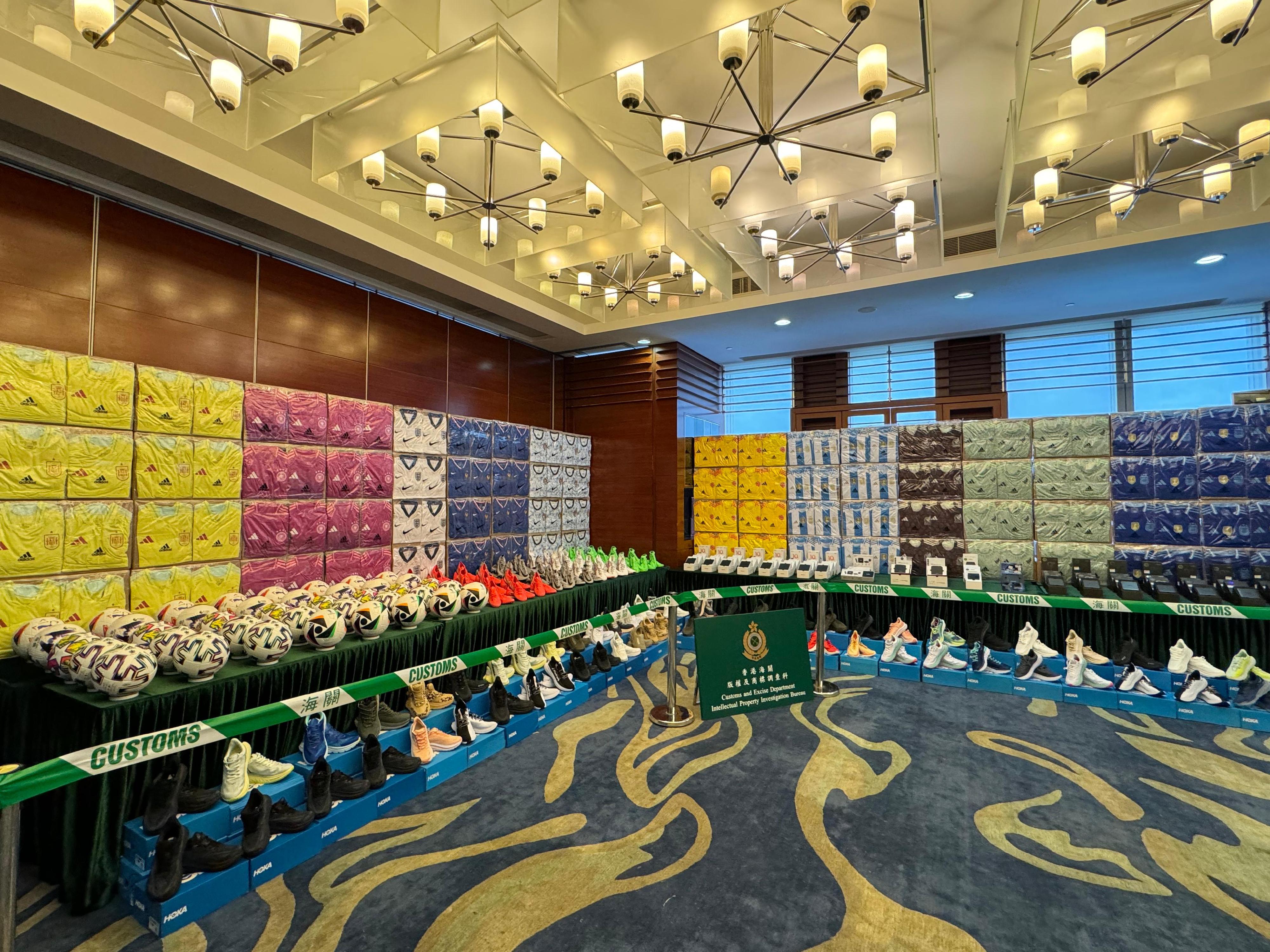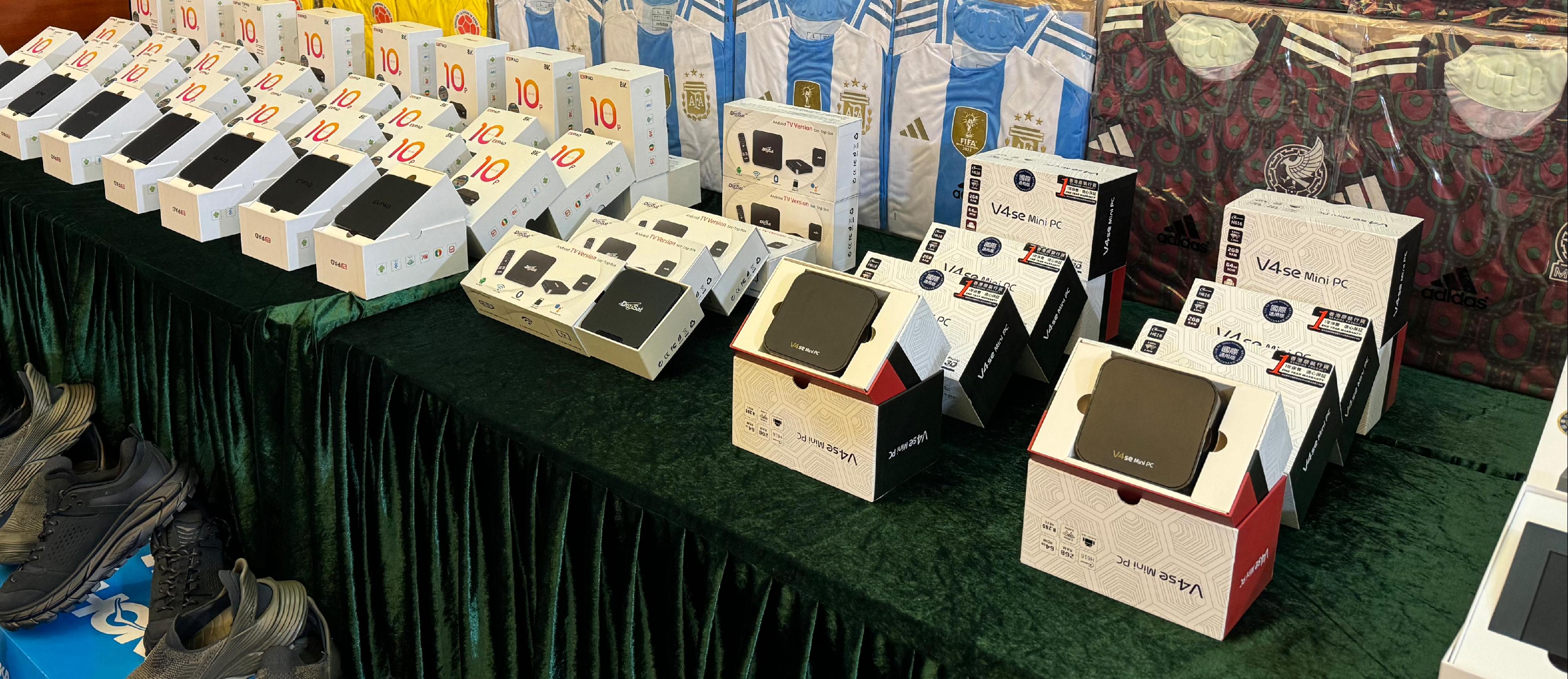Hong Kong Customs adopts three-pronged operation combining enforcement, inspection and public education to protect intellectual property rights during major sports events (with photos)
As a number of international sports events will be held consecutively starting this month, Hong Kong Customs conducted a three-week special operation from June 3 to 23 by adopting a three-pronged strategy combining enforcement, inspection and public education to protect intellectual property rights.
On the enforcement front, Customs officers combat infringing activities at every level, including cross-boundary transhipments, local retail, and online and technology-related crimes. During the operation, Customs detected 33 related cases in total and seized about 68 000 items of suspected infringing goods with a total estimated market value of over $52 million. Nine persons were arrested.
Regarding cross-boundary transhipments, through big-data and intelligence analysis, as well as in-depth investigations and surveillances, Customs identified and raided over 60 logistics centres in Kowloon Bay, Kwai Chung, Tsing Yi, Tsuen Wan, Tuen Mun and Yuen Long, and selected a container arriving in Hong Kong from Nansha, Guangdong, at the Tuen Mun River Trade Terminal for inspection. As a result, Customs detected 27 related cases and seized about 67 000 suspected counterfeit goods, including watches, handbags, clothes, footwear and sporting goods, with a total estimated market value of about $51 million. A 62-year-old woman who was responsible for arranging the transhipment of the goods was arrested.
After investigations, Customs believed that most of the suspected counterfeit goods would have been re-exported to Europe, America and Middle East regions.
On the technology crimes' side, after a comprehensive investigation and with the assistance of the copyright owners, Customs officers raided six retail shops in Wan Chai, Kwun Tong, Hung Hom and Yuen Long on June 12 to crack down on infringing activities involving unauthorised communication of copyright works to the public. The case involved about 130 suspected illicit streaming devices and a batch of electronic products and audio and visual equipment, with an estimated market value of about $230,000. During the operation, four men aged between 32 and 48, including three shop owners and a salesperson, were arrested.
Also, Customs, carried out cyber patrols and made use of a big-data analytics system to conduct risk assessments and analyses and found that suspected counterfeit jerseys had been put on sale online. After an investigation and with the assistance of trademark owners, two cases of suspected counterfeit jersey sales through online platforms were cracked down during the operation. Thirty-one suspected counterfeit jerseys, with an estimated market value of about $30,000, were seized. A man and a woman, aged 24 and 30, were arrested.
On the retail side, Customs earlier received information alleging that some shops were selling suspected counterfeit sports-related products at low prices. Customs officers then swiftly took action on June 22, and raided four stalls inside a flea market at Kam Sheung Road and a retail shop nearby. During the operation, Customs arrested two shop owners, aged 50 and 39, and seized around 1 000 suspected counterfeit sports related products with an estimated market value of about $700,000.
Investigations of the above-mentioned cases are ongoing. All arrested persons have been released on bail pending further investigation.
Customs also launched a high-profile seven-day operation from June 13 and deployed officers across the territory, including Sham Shui Po, Yau Tsim Mong, Wan Chai, Kwun Tong, Tuen Mun, Yuen Long, Tai Po, Sheung Shui, and Islands District, to conduct anti-infringement activities inspections. Customs also took the opportunity to distribute promotional leaflets to stores, bars and restaurants, and explained the relevant legal requirements to the merchants to prevent them from violating the laws unwittingly.
Additionally, in terms of education, Customs organised an Intellectual Property Rights Seminar for members of "Customs YES" in June to promote Customs' work in protecting intellectual property rights, the relevant legislation and the Copyright (Amendment) Ordinance to campuses and to sow the seeds of respecting intellectual property rights among youth. In July, Customs will hold a seminar in conjunction with the Intellectual Property Department to deepen the understanding about the respect for intellectual property rights and legal requirements of the bar and catering sector.
Customs appeals to consumers to purchase goods at reputable shops or websites and to check with the trademark owners or authorised agents if the authenticity of a product is in doubt to avoid buying counterfeit goods. The department also reminds traders or online sellers not to sell counterfeit goods, and to be cautious and prudent in merchandising since selling counterfeit goods is a serious crime and offenders are liable to criminal sanctions.
Customs reminds practitioners in the logistics industry to comply with the requirements of the Trade Descriptions Ordinance (TDO) and to check with the trademark owners or authorised agents if the authenticity of a product is in doubt when handling cargoes.
Under the TDO, any person who imports or exports or sells or possesses for sale any goods to which a forged trademark is applied commits an offence. The maximum penalty upon conviction is a fine of $500,000 and imprisonment for five years.
Customs also reminds merchants not to take part in activities involving unauthorised communication of copyright works to the public. Also, members of the public should respect intellectual property rights and not buy any illicit streaming devices. Unknown websites connected with the illicit streaming devices might contain computer viruses or malware which can pose a risk to users.
Under the Copyright Ordinance, any person who, without the authorisation of the copyright owner, communicates a copyright work to the public for the purpose of or in the course of any trade or business that consists of communicating works to the public for profit or reward; or communicates the work to the public to such an extent as to affect prejudicially the copyright owner, commits an offence. The maximum penalty upon conviction is imprisonment for four years and a fine of $50,000 in respect of each copyright work.
Customs will continue to step up inspections and enforcement to vigorously combat different types of infringing and counterfeiting activities.
Members of the public may report any suspected counterfeiting or infringing activities to Customs' 24-hour hotline 2545 6182 or its dedicated crime-reporting email account (crimereport@customs.gov.hk) or online form (eform.cefs.gov.hk/form/ced002).

